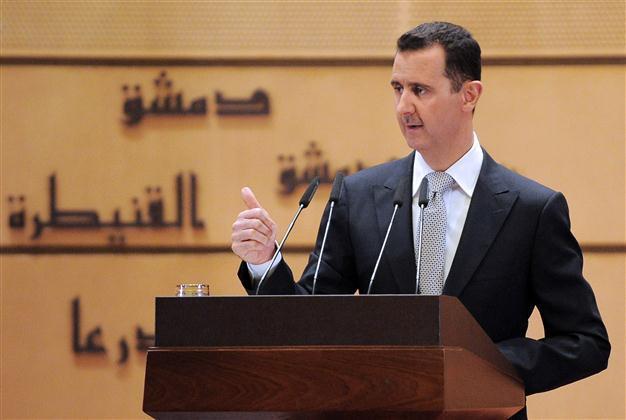World powers accuse Assad of 'shifting blame' for killings
DAMASCUS - Agence France-Presse

In this photo released by the Syrian official news agency SANA, Syrian President Bashar Assad delivers a speech at Damascus University, in Damascus, Syria, Tuesday, Jan. 10, 2012. AP Photo
World powers have accused Syrian President Bashar al-Assad of trying to shift the blame for bloodletting in the protests against his regime after he accused foreign interests of stoking the violence.Amid the finger-pointing, activists said four civilians were killed on Wednesday near the central city of Hama and that loyalist troops were clashing with deserters.
In a speech on Tuesday, Assad vowed to crush "terrorism" with an iron fist, prompting opposition movements to accuse him of inciting violence and calling on the world to isolate his regime.
Speaking just hours before the UN Security Council met to discuss Syria, Assad denied that security forces had orders to fire on civilian protesters, even as activists reported regime gunmen killed 13 more civilians.
He said the unrest, which the UN estimated last month has killed more than 5,000 people since March, would only end "when the flow of funds and weapons coming from abroad stops".
"Regional and international parties who are trying to destabilise Syria can no longer falsify the facts and events," the embattled leader said in the nearly two-hour speech.
Assad said restoring security was the "absolute priority" and pledged to tackle terrorism with an "iron fist," after a Damascus suicide bombing killed 26 people on Friday.
"There can be no let-up for terrorism -- it must be hit with an iron fist," he said. "The battle with terrorism is a battle for everyone, a national battle, not only the government's battle." Washington said Assad had used the speech to try to deflect the attention of his people from the fact that he had committed himself to end the violence.
"He's doing everything but what he needs to do," said State Department spokeswoman Victoria Nuland.
She said Assad must meet Syria's commitments to the Arab League to end the violence, withdraw heavy weapons from cities, admit journalists, free political prisoners and allow for a real political dialogue.
"So that's what we're looking to see in Syria, and obviously this was an effort to deflect the attention of his own people from the real problem." French Foreign Minister Alain Juppe said Assad was "divorced from reality" and accused him of inciting violence, while vigorously condemning attacks on Arab League observers in Syria.
In New York, Assistant Secretary General B. Lynn Pascoe told the Security Council that 400 people had been killed since Arab League observers began their work on December 26 to assess Assad's implementation of the peace deal.
US Ambassador Susan Rice said the daily death rate was higher than before the Arab deployment and reaffirmed calls for the council to pass a resolution condemning the crackdown.
She said Syria's government was "willingly, blatantly and in cold blood, massacring its own people" and reaffirmed the US administration's calls for Assad to stand down.
In Istanbul, the head of the opposition Syrian National Council, Burhan Ghalioun, expressed alarm about Assad's "dangerous speech in which he stated his determination to use violence against our own people".
"He has cut short any Arab or other initiative to find a solution to the crisis," Ghalioun said, adding the speech showed Assad's "determination to divide and push the country towards civil war".
Ghalioun called on the world community to "work to ensure the international protection of Syrian civilians," while urging the Arab League to turn to the Security Council for help.
The Local Coordination Committees, which organise the protests, said Assad's speech proved he was ordering killings, given that he he instructed security forces to "continue to beat the activists with 'an iron fist.'" It called for civil resistance to widen the uprising while urging the Arab and international communities to cut off the regime and "paralyse its repressive behaviour." Assad insisted security personnel had no orders to shoot. "By law, nobody can open fire, except in self-defence." He rejected opposition charges his regime was a dictatorship.
"I rule with the will of the people. If I give up power, I will do so with the will of the people too. The largest part of the Syrian people want reform and do not go out and violate laws." Assad said a new constitution being drawn up by a committee set up in October to replace the current one, which enshrines his Baath party's dominant role, and could be put to a popular vote as early as March.
In addition to the four civilians killed near Hama, the Syrian Observatory for Human Rights also said regime forces used live ammunition and tear gas to disperse students demonstrating in Daraya, in Damascus province, and residents of a town in Idlib province were on strike to protest their living conditions.
On Tuesday, 22 civilians died around the country in the ongoing regime crackdown.
















